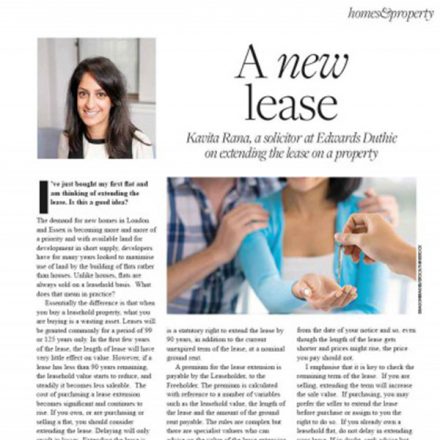Extending the lease on a property
The demand for new homes in London and Essex is becoming more and more of a priority and with available land for development in short supply, developers have for many years looked to maximise use of land by the building of flats rather than houses. Unlike houses, flats are always sold on a leasehold basis. What does that mean in practice?
Essentially the difference is that when you buy a leasehold property, what you are buying is a wasting asset. Leases will be granted commonly for a period of 99 or 125 years only. In the first few years of the lease, the length of lease will have very little effect on value. However, if a lease has less than 90 years remaining, the leasehold value starts to reduce, and steadily it becomes less saleable. The cost of purchasing a lease extension becomes significant and continues to rise. If you own, or are purchasing or selling a flat, you should consider extending the lease. Delaying will only result in losses. Extending the lease is essential if you have a short term lease.
At the point where there are 80 years or less remaining on a lease, the costs of extending can rise substantially due to the statutory rules on valuation of leasehold properties. Did you know that most owners of residential leasehold property have a statutory right to extend the lease? The right to request a lease extension generally commences once you have owned the leasehold for two years. There is a statutory right to extend the lease by 90 years, in addition to the current unexpired term of the lease, at a nominal ground rent.
A premium for the lease extension is payable by the Leaseholder, to the Freeholder. The premium is calculated with reference to a number of variables such as the leasehold value, the length of the lease and the amount of the ground rent payable. The rules are complex but there are specialist valuers who can advise on the value of the lease extension and good quality valuation and legal advice is essential.
Once the likely amount of the premium has been ascertained, you can agree the premium to be paid for the lease extension via informal negotiation with the Freeholder or (if that is not successful) by serving a statutory notice. If you cannot settle, an application to the First-tier Tribunal (Property Chamber) is necessary, the valuation of the lease extension will be fixed by the Tribunal from the date of your notice and so, even though the length of the lease gets shorter and prices might rise, the price you pay should not.
I emphasise that it is key to check the remaining term of the lease. If you are selling, extending the term will increase the sale value. If purchasing, you may prefer the seller to extend the lease before purchase or assign to you the right to do so. If you already own a leasehold flat, do not delay in extending your lease. If in doubt, seek advice but always remember that acting sooner rather than later on a lease extension will undoubtedly be to your benefit.
Article from www.westessexlife.co.uk
